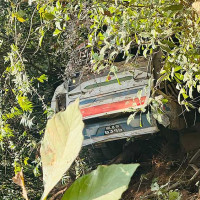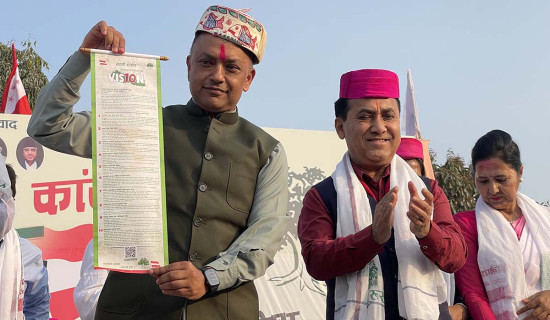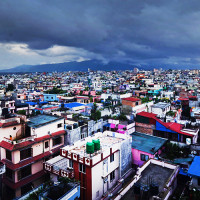- Thursday, 19 February 2026
Call For Reforming Political Parties
The Gen Z protest on 8 and 9 September has reframed the narrative of popular revolt and sent a strong message to political parties that they are not at liberty to remain indifferent to the youth's aspirations, despite having received an electoral mandate. For the first time in Nepal's history, a mass of politically unorganised youths revolted and overthrew a government touted to be one of the strongest, exposing its ideological hollowness and a weak popular support on which it was based.
This revolt has raised a serious question on the electoral mandate of political parties, drawing attention to the fact that even a legitimate power can be challenged if it remains unresponsive to the demands and expectations of ordinary people. This dissatisfaction of youths was not a sudden outburst but a culmination of pent-up public anger against the system. The three major political parties, the Nepali Congress, CPN-UML and the CPN-Maoist Centre, were under the scanner of the youths. Parties were accused of institutionalising corruption, making elections a tool for grabbing power and blocking the career path of youths by encouraging gerontocracy.
Complicity in corruption
For quite a long time, the top-level leaders of these parties were being excoriated in social media posts for their inaction, complicity in corruption, failure in putting the country on the track of sustainable development and compelling thousands of youths to migrate to foreign employment destinations daily. There were issues about inner-party democracy within these parties, too. The lower and middle-level party cadres were criticising their leaders for running parties like their fiefdoms. There were voices against one-upmanship and for the implementation of the principle of collective leadership.
In sharp contrast, however, leaders of major political parties continued to entrench their power base, suppressing dissenting voices, taking disciplinary action, suspending and expelling competitors from party hierarchies. Instead of allowing party members to exercise their freedom to choose their leaders based on qualification, commitment and creative vision, a close circle of top leaders decided whom to coopt to which position, instead of allowing the rule of succession to take place naturally.
Central leadership of the party reserved the right to issue tickets for candidacy in parliamentary elections and local cadres had the least say in recommending candidates. Once elected, parliament members were expected to work as pawns to be used on the chessboard of political manipulation. While ideologically conscious, honest and dedicated party workers suffered, selfish, ideologically bankrupt and selfish people enjoyed privileges.
The Gen Z's protest, therefore, was not unexpected. It came as a nemesis for the inexcusable crime of misusing the decades of opportunity endowed to political parties to prove the superiority of the democratic system. But the bitter part of the Gen Z protest was that it was infiltrated by the enemy of democracy to inflict destruction on invaluable national heritages and monuments of history. The macabre destruction that was staged against institutions of national heritage must never be condoned.
Gen Z must also admit that, despite their good intent, they brought an unprecedented destruction to national heritages and inflicted a severe dent in the self-esteem of political parties, pushing them to a defensive mode. Though a generation of political leaders defiled the image and sanctity of the party system through their unethical conduct, the party system is indispensable for democracy to flourish. The political parties are now compelled to decide whether to lose relevance by sticking to an authoritarian style or stage a resurgence through reform. The Nepali Congress and the Maoist Centre have taken steps, even if nominal, towards reform and change. Strangely, however, the UML has not yet admitted weaknesses and shortcomings.
In a democracy, political parties are indispensable agencies to link governance with the public space. They are the lynchpins that hold the wheel of democracy in place, assuring stability and proper functioning of statecraft. This revolt of the youths was shockingly unpleasant for the parties but there is no other way for them than to reconcile with the reality. Irrespective of its destructive and diabolical consequences, it has provided an opportunity for the parties to reform themselves and remain relevant. The majority of party workers are for reform but a small upper crust of the leadership still appears against change and reform.
Inner party democracy
The political parties cannot afford to lose time in self-pity. They should acknowledge their flaws and set about functioning in conformity with true democratic culture. There are mainly three areas of reform for political parties to focus on. The most important of them is inner party democracy. At present, the system of cooption is entrenched in all the parties. To allow the inner democracy to flourish, parties must adopt criticism and self-criticism as a tool for resolving differences. Another important area of reform is the electoral system for choosing office bearers of the party. The system of nomination and cooption should be completely done away with. The third area of reform is to introduce a system of primary elections to select the candidates of the parties for the parliamentary and local elections.
Similarly, a strict two-term system should be introduced for all the elected positions from the ward to the central level. This system will help enforce accountability and ensure the evolution of inter-generational leadership with ample prospects for youths to play their role effectively. Failing to do so will promote a culture of authoritarianism, concentration of power and corruption, pushing the country to further chaos and violence.
(Dr. Bharadwaj is a former ambassador and former chairperson of Gorkhapatra Corporation. bharadwajnarad@gmail.com)



-original-thumb.jpg)











